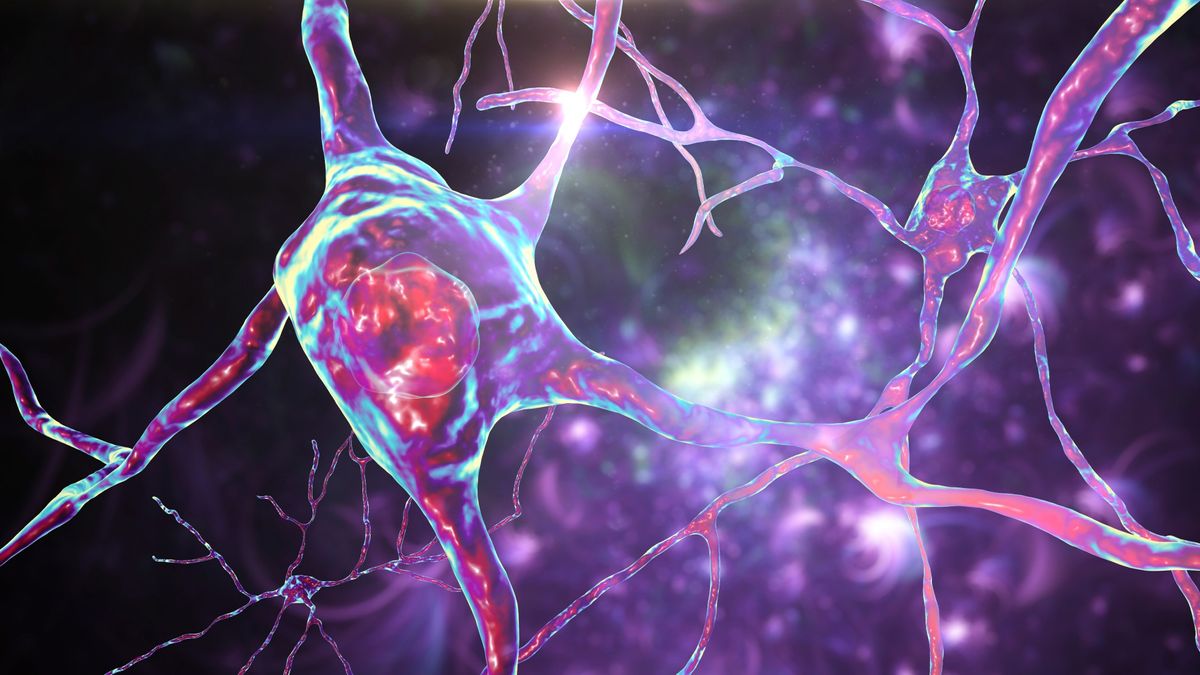Scientists have identified an enzyme that may play a crucial role in triggering Huntington’s disease, a rare and deadly disorder that causes brain cells to decay.
New research in rodents and humans has shown that the levels of a specific enzyme — glutathione S-transferase omega 2 (GSTO2) — go up in the brain prior to the start of Huntington’s symptoms.
These findings, published Oct. 28 in the journal Nature Metabolism, may point to new ways to head off Huntington’s before it develops, the study’s authors say. Future treatments could include drugs that block GSTO2, to halt or slow the progression of the disease.
Huntington’s disease is an inherited disorder caused by a mutation in a gene called HTT, which carries instructions for a protein called huntingtin. A parent who carries this mutant gene has a 50% chance of passing Huntington’s disease to each child.
Related: Lab-grown ‘minibrains’ help reveal why traumatic brain injury raises dementia risk
The mutation spurs cells to make too much dopamine — a key chemical messenger in the brain — and this causes certain neurons to degrade. This decay is particularly pronounced in a part of the brain called the striatum, causing patients to develop cognitive and movement-related symptoms. These can include difficulty walking, involuntary jerking movements, and trouble focusing.
Huntington’s symptoms typically start to appear in a person’s 30s to 50s. The condition progressively impairs a patient’s ability to function, eventually causing death about 10 to 30 years after symptoms begin.
Until now, scientists haven’t been able to explain why the HTT mutation results in excessive dopamine production. That’s one reason there is no cure for Huntington’s — the available drugs only help to alleviate the symptoms once the damage has been done. The HTT gene is also active throughout the body, making it difficult to develop targeted treatments that combat its effects in the brain.
In the new study, the researchers took a different approach: “Instead of looking at the mutation in this particular gene that causes Huntingon’s disease, we looked at the signals that this mutation affects and what they do,” Liliana Minichiello, lead author of the study and a professor of cellular and molecular neuroscience at the University of Oxford, told Live Science.
Brain cells pass chemicals to one another in order to communicate. In addition, within each brain cell, chain reactions of chemical activity help neurons to survive, grow and maintain their integrity. For instance, there are signals needed to keep neurons alive, and these signals are known to malfunction in Huntington’s disease. Specific neurons in the striatum are most vulnerable to having their signaling derailed in this way.
To investigate this idea further, the researchers bred genetically modified mice whose striatum cells couldn’t produce these key survival signals. They noticed that the dopamine levels in the rodents’ brains increased months before the rodents developed any movement symptoms that resembled early Huntington’s.
By measuring the gene activity of the striatum neurons, the researchers found that disrupting the cells’ survival signals seemed to increase the amount of GSTO2 in the cells. Ultimately, this boost in GSTO2 is what drove up dopamine production and led to progressive motor dysfunction in the mice.
Blocking GSTO2 prevented this whole process from happening, the team found.
In separate experiments, the researchers saw a similar increase in GSTO2 in the brains of rats with a condition similar to Huntington’s, as well as in brain tissue from patients with Huntington’s. Both the rats and the people showed this boost in GSTO2 but had yet to develop any noticeable symptoms of the conditions.
Taken together, these findings reveal distinct cellular changes that might trigger the onset of Huntington’s disease.
The researchers now need to look more closely at the role of GSTO2 in rodents that carry the HTT mutation, to double-check that the link is causative. If it is, GSTO2 may be a potential new target for drugs designed to halt or slow the progression of Huntington’s, Minichiello suggested.
Ever wonder why some people build muscle more easily than others or why freckles come out in the sun? Send us your questions about how the human body works to [email protected] with the subject line “Health Desk Q,” and you may see your question answered on the website!














